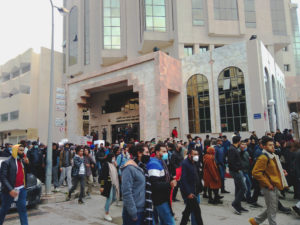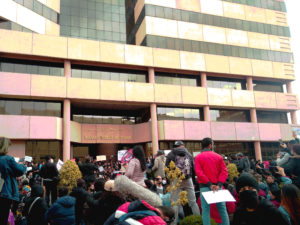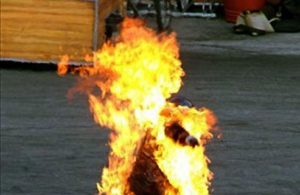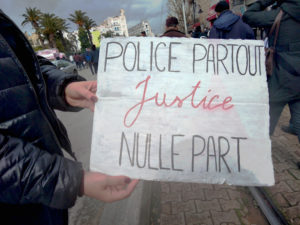By Alessandra Bajec
Every January since 2011, protesting has become a regular event in Tunisia to mark the tenth anniversary of the revolution that toppled the regime of longtime dictator Zein el Abdine Ben Ali — and sparked what became known as the Arab Spring. Despites these yearly protests, however, Tunisia has failed to make any substantial progress in the daily lives of its citizens as the country’s democratization is not accompanied by a socio-economic transition.
Reflecting on this failure, this year’s protests were different. Throughout the month of January, nightly demonstrations rocked underprivileged neighborhoods in the capital like Ettadhamen and Douar Hicher and many cities across the country for more than a week. Scores of youths between the ages of 15 and 30 clashed with security forces. Some incidents of looting and vandalism were reported. The military and police responded with excessive use of force and mass arrests of over 1,600 mostly- young people, one third of whom are minors.
Police block thousands of protesters from entering the city center of Tunis as protesters decry police abuse. Voice of America, Reuters.
The round of night-time protests began on anniversary day, January 14th, which coincided with the start of a four-day national lockdown ordered ostensibly to contain a recent spike in COVID-19, although many Tunisians claimed the mini-confinement had been imposed to dissuade people from demonstrating, rather than for public health reasons.
The revolts hit different locations, from Tunis’ poor urban areas to Siliana, Kairouan, Kasserine and Gafsa in the interior to seaside towns such as Bizerte, Nabeul, Sousse and Monastir.
Day-time rallies followed in protest against police repression, corruption and a dire economic situation exacerbated by the coronavirus pandemic. The activists also made demands for the release of detained young demonstrators. Protests went on throughout the second half of January, with some rallies continuing into February. The wave of youth unrest was unprecedented. Students, school dropouts, the jobless — for the most part not affiliated with any political parties — revolted in working-class neighborhoods. Their protests reflected a broader awareness of high unemployment, impoverishment and worsening living conditions.

Heythem , a late-20s activist from the Tunisian “Hold Them Accountable” (Hassebhom) movement, told Toward Freedom that the actions of the youths in the periphery were “political“ even as they looted supermarket chains. “They sent a political message: ‘we are hungry, we need to fight for our small businesses,’” he asserted. “When these kids see police raiding their districts and assaulting their peers, they are making a clear demand to ‘get out of my neighborhood!’”
Once the street demonstrations entered the center of the Tunisian capital during daytime, the protest movement grew even larger to include civil society actors, rights groups, leftist partisans, representatives of left-wing parties, anarchists and queer activists.
Widespread anger over socio-economic deprivation and police abuse was reflected in the large, varied participation in the streets of downtown Tunis.
“As soon as the protest scene moved to the capital, the crowds Ouiem Chettaoui told Toward Freedom. Chettaoui is a public policy specialist focusing on socio-economic issues in Tunisia. She said those demonstrators helped formulate “more explicit demands,” presumably given their political background and experience of activism.
One new group of young anti-fascist activists, “The Wrong Generation,” has mobilized in a more inclusive fashion compared to other protesting groups, reaching out to youths in deprived neighborhoods. Their intent is to better understand the grievances of local residents, while keeping regular contact with them.
Another group, the National Campaign to Support Social Struggles, issued a statement articulating a set of popular demands following January’s protests called the Peoples Program Against the Elite Program. Some of the demands include releasing all detainees and dismantling the police repressive system; raising the minimum wage from just under 400 TND (146$) to 600 TND (219$) per month and granting monthly unemployment benefits of 400 TND; distributing state-owned land and neglected lands of large landowners to landless agricultural workers, unemployed and small farmers; and reviving the national textile industry.

Amayed Aymen, a 29-year-old activist and independent researcher from Gafsa, witnessed greater attendance in this January’s rallies, although he believed members of established civil society groups and political militants remained detached from the daily problems of those from marginalized districts.
“They [the civil elite] don’t know what’s happening in the suburbs or the interior, They hardly visit those areas, yet a lot of them tend to speak in the people’s name even though it’s not their struggle”, the researcher noted.
“When you see children rising up it’s a very bad sign,” he added. “It means they too feel the impact of the crisis. You can see Tunisians struggling to buy essentials and lead normal lives. The situation is always worse for those living in low-income areas.”
The country is grappling with an inflation rate of 7.5 percent, and unemployment is over 15 percent, with one third of the number comprised of youths. The GDP declined by 9 per cent last year.
Faced by rampant youth joblessness, lack of life prospects, and a heavy-handed security response to their problems, all that these young Tunisians wanted was to be heard.
Politicians Focused on Vandalism
The predominant silence from government officials in reaction to the nightly unrest disappointed the activists. Some politicians and party leaders broke their silence days later, showing, however, very little empathy. Rather than attempting to understand what could have motivated such waves of anger, political parties preferred focusing their attention on the acts of vandalism and pillage which occurred during the riots.
Rached Ghannouchi, the parliament speaker and leader of the Muslim party Ennahdha, scornfully addressed the angry youths on TV: “Vandalism and pillage won’t bring you employment,” he insisted. Some leading Ennahdha figures accused youth protesters of being saboteurs and criminals.
In another televised speech, Prime Minister Hichem Mechichi said he understood the protesters, but the “law will be enforced.”
During a visit to a suburb of Tunis, President Kais Saied talked to a dozen young people urging them to refrain from targeting people or property.
On January 26th, the Tunisian parliament held a vote of confidence in a reshuffle of Mechichi’s government. It met amid heavy police security, resembling a state of siege, as hundreds of protesters gathered nearby calling for the downfall of the system.
Tweeted Nesrine Jelalia, executive director of the Tunisian parliamentary watchdog Al Bawsala,“Instead of preparing to receive a delegation of young protesters at the ARP [parliament] to engage them in dialogue and listen to them, the ARP and the other state institutions chose to barricade themselves by way of barbed wire and tanks.”
The Jasmine Revolution: some democracy gained; but economic and social rights forestalled
Ten years on, the discontent amongst the population is palpable. The post-revolution political establishment has clearly failed to fulfil the very aspirations chanted by those who fought in the uprising. Yet the 2011 Tunisian upheaval, dubbed the “Jasmine Revolution,” resulted in a nascent democracy that has so far moved through a bumpy though peaceful transition despite all the economic, political and social challenges. The small North African nation has often been praised as the Arab Spring’s only success story due to its democratic experiment, which was the first and the longest in the Arab world resulting from the protests. Since then, many Tunisians are enjoying hard-won rights and freedoms, both public and individual, one of the most solid gains being freedom of speech.
But originally the revolution was not about democracy. During the 2010-2011 popular revolts that swept across Tunisia’s interior regions, the notorious slogan “work, freedom and national dignity” best represented the core demands that first drove people into the streets. It was above all about improving their livelihoods. When on December 17, 2010 the street vendor Mohammed Bouazizi set himself on fire which triggered the Tunisian revolution, he did it in protest against government corruption and widespread unemployment.

Later, as the upheavals spread throughout the country and reached the capital, civil society groups, opposition parties and trade unions joined the movement. Only then, political change became a demand.
Mehdi Barhoumi, project manager for the NGO International Alert in Tunisia, explained to Toward Freedom that the priority for the political elite was the “democratic question” as opposed to the “socio-economic” one. “The structural change that was needed to create a fair, equitable model hasn’t happened,” he complained.
For many young revolutionaries and activists, once the political and civil elites seized the uprising as an opportunity to ouster the former autocrat, issues like transfer of power and democratic transition took over the original calls for socio-economic rights heard in the early protests.
The young activist Heythem is also a former member of the movement called “I will not forgive” (Manich Msameh) which lobbied against corruption and impunity. He pointed out that after Ben Ali fled the country on January 14th, 2011, opposition figures and established civil organizations voiced institutional demands, namely the drafting of a constitution and the holding of free and fair elections, which were “not the demands of the people.”
Tunisia held free elections (both presidential and legislative) twice since the revolution, in 2014 and 2019. Heythem noted that after voting in two sets of democratic elections for the first time, Tunisians have come to realise that post-2011 political leaders do not act in the public interest as they hoped. Instead, they are inclined to protect interest groups and crony capitalists since many of them are connected with these well-entrenched privileged networks.
“The revolutionary process was quickly hijacked by interest groups, whether political, business or financial elites, which have time and again hindered the country’s progress,” Ouiem Chettaoui observed. That, in her view, was because the core popular protest movement back in 2011 was not very well organized, and political forces who opposed the regime were too weak and uncoordinated to form a cohesive bloc that could back the protest movement in its demand for change.
One decade into the revolution, in the midst of tumultuous politics, more than ten successive elected governments have failed to enact much-needed reforms such as enacting regional social and economic grievances, and fighting corruption and nepotism.
Wealth Remains Concentrated on the Coast and Accountability is Elusive
Far from reversing the socio-economic status quo, the post-2011 political leadership has reproduced the same mechanisms that have been perpetuating regional inequalities since the North African state secured its independence in 1956. That is, the wealth is mostly concentrated in the coastal areas at the expense of the neglected hinterland which has been struggling with poor infrastructure, scarce resources and limited access to job opportunities.
Sayida Ouniss, a parliamentarian representing the Muslim party Ennahdha, acknowledged that the right to access economic resources is one central question that should have been prioritized, but instead has not been dealt with until now, implying that “political will” has been missing. If addressed, she told Toward Freedom, ” this key matter would unlock business opportunities, facilitate the creation of companies, hire workers formally, and guarantee the provision of social security coverage.”
Mehdi Barhoumi, who is also a rights and governance expert, reiterated that the old economic model has been maintained, thus “reinforcing regional imbalances” which the pandemic has further highlighted in terms of access to health and social services.
The struggle for accountability has also been a tough one. Tunisia’s transitional justice process, which was established to restore victims’ dignity and confront decades of corruption and violence, has suffered major setbacks. Most have come from the country’s political leadership and Tunisian elites. Government officials, along with security and judicial authorities, obstructed the work of the Truth and Dignity Commission (TDC), set up in 2014. The TDC is charged with investigating human rights violations, corruption and economic crimes committed throughout the country’s dictatorship and in the years that immediately followed the revolution,. The government prevented access to evidence in archives and files. Parliament even attempted to prevent the extension of the commission’s mandate. Moreover, the highly controversial administrative reconciliation law, passed in September 2017, gave amnesty to civil servants guilty of corruption, which subverted the official transitional justice process.
A constitutional court has still not been formed since its establishment in 2014 due to parliament’s incapacity to appoint its final three members, leaving Tunisian democracy ill-equipped to regulate the distribution of power within the country’s political regime, especially in times of crisis.
“Without a legal body to sort out who is right, crucial matters like the naming of ministers have devolved into political infighting and chaos, preventing the country from moving forward,” explained Sarah Yerkes, a senior fellow in the Carnegie Endowment for International Peace’s Middle East Program who specializes in Tunisia’s politics and economy.
To make things more difficult, Tunisia has been living through ongoing political instability since the revolution, as successive short-lived cabinets, with political leaders busy with their own internal disputes, have either postponed or blocked the implementation of key reforms. The government is simply lacking the continuity it needs to work as it should, especially at a time of crisis such as the coronavirus pandemic.
Prioritising political progress since 2011 has not translated into improved livelihoods and dignity for everyone. Civil and political liberties without economic opportunities and social equity means little to the populace.
“Police Everywhere, Justice Nowhere”
In an increasingly polarized political environment, the government is well-aware of its inability to provide necessary solutions to citizens. Instead, it, has chosen to contain popular anger by beefing up security.

The relationship between security forces and the urban poor in Tunisia has long been tense. Repressive practices adopted in Ben Ali’s time (1997-2011) continued after the 2011 revolution. The young activist Amayed Aymen spoke about the constant police abuse that youngsters from underprivileged neighborhoods have to put up with. “The cops regularly stop and check IDs of young men in central Tunis, based on their appearance.” If they stop someone from a marginalized place,” he added, “they will ask him ‘what are you doing here?,’” underscoring the restricted freedom and little dignity these young people have.
But because these same young Tunisians in their mid-late teens or early twenties did not live under Ben Ali’s dictatorship, they ignore what authoritarianism is and expect to be free in the post-revolution age. They know they have rights and are ready to fight for them. They largely perceive the government and the whole system as corrupt. They reject political parties and Islamists, members of the old regime and others, and stand against the abuse of power by the police and any authority that dictates to them what to do. “Police everywhere, justice nowhere,” read some of the banners raised in January’s demonstrations.
Political leaders have not broken with the old economic and social choices made under Ben Ali, and today’s youth want to break with the current political class that has repeatedly proved to be incompetent.
Meanwhile, remnants of Ben Ali’s policies have protracted an exclusive development model, letting the informal economy grow, with its increasingly precarious little-paid labor, while denying irregular workers the right to be integrated into the formal sector in order to gain access to better economic opportunities.
MP Ouniss admitted that the big mistake committed by all parties over the years has been not prioritizing greater access to the production of wealth. “It takes political courage from everyone to take a stance against crony capitalism, to open a debate and legislate on this dossier,” the lawmaker opined. Taking action on this critical issue, she continued, would enable the refilling of coffers, including social security funds, allowing the state to allocate more adequate spending in the sectors of education, health, transportation and infrastructure, as well as designing and implementing public policies to ensure economic and social equity.
In Mehdi Barhoumi’s view, “the real problem has been not questioning the economic and social system we have. We need to have a new model based on better wealth redistribution,” alluding to job scarcity and dwindling, poor quality state services in the interior, in the south and in suburban areas.
Tunisia’s revolutionary course is challenged by regressive moves coming from multiple players. These include the circles of capitalists and financial interest groups, the political elites, the largest moderate Islamist Ennahda party (which is the only stable political force since the revolution) and counter-revolutionary politicians like Abir Moussi, a former official in Ben Ali’s party who openly praises the old regime and whose Free Destourian Party (PDL) leads in the polls.
Outside Forces Also Impede Change
Challenges do not just come from the inside, however. The International Monetary Fund (IMF), the country’s most important foreign donor, is probably the biggest counter-revolutionary external actor. The IMF policy in Tunisia is another source of economic pressure. Its loans have come tied to a drastic austerity program compounding the North African state’s social woes, especially in internal regions, while doing little to try to resolve the structural problems facing the national economy. The fund’s neoliberal directives have significantly undermined the transitional governments’ feeble efforts to enact socially and economically just measures to respond to people’s demands.
Saudi Arabia and the United Arab Emirates (UAE) have also played a role, supporting anti-democratic forces in Tunisia and recently focusing their backing on the counter-revolutionary leader, Abir Moussi.
The US government has provided over US $100 million in aid to Tunisia to strengthen the country’s law enforcement and the judiciary. Part of the assistance has gone toward modernizing the interior ministry’s flagship police academy and enhancing police and National Guard training capacities in programs including crowd control. [Text continues below]

Since 2011, there has been increasing military cooperation between the United States and Tunisia. In 2015, the US State Department classified the small North African state as its sixteenth major non-NATO ally, saying such a partnership agreement sent “a strong signal of our support for Tunisia’s decision to join the world’s democracies.” This statement did not resonate well with the Tunisian public. “Since when has NATO promoted ‘democracy’ in southern rim Mediterranean countries?” asked Francis Ghilès, a leading European expert on the Maghreb, in an op-ed. After NATO forces bombed Libya, he noted, the “UK and the US just walked away from Libya in the autumn of 2011, leaving Tunisia to cope with a massive refugee influx. They left a failed state and huge caches of modern weapons that then flowed into neighboring countries.”
Tunisia is a reluctant partner of the alliance, wishing to preserve national sovereignty in security matters, which is not easy in a context of regional turbulence, particularly when it is engrossed in economic and social troubles at home. The government opposes the presence of any foreign organizations inside the country, seeming uncomfortable to tell citizens that Tunisian military bases are used by Western powers for operations in neighboring countries, or that there are foreign boots on the ground.
“NATO is very unpopular in our country. I am still struggling to understand why we need help from those who set the region in fire.” tweeted Chafik Ben Rouine, co-founder of the Tunisian Observatory of Economy (TOE).
Meanwhile, the youthful protest movement that emerged from January’s unrest has only just started to define itself. These young protesters are painfully aware of the reality in which they live. They are driven by clear demands and reject the status quo politics delivered by the post-2011 establishment.
Whether their movement will have enough stamina to keep mobilizing and pushing for change — against a government that will continue its security-focused response –remains to be seen.
Alessandra Bajec is a freelance journalist specializing in the Middle East and North Africa. Between 2010 and 2011 she lived in Palestine. She was based in Cairo from 2013 to 2017, and since 2018 has been based in Tunis
